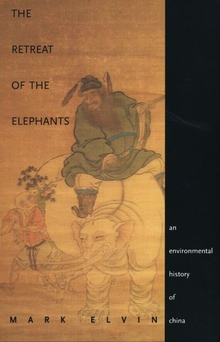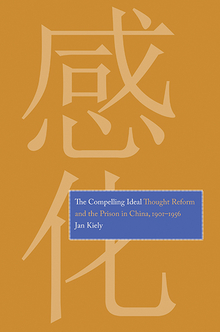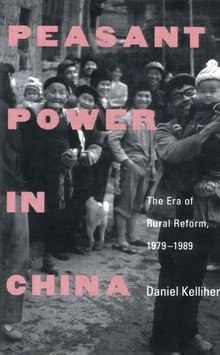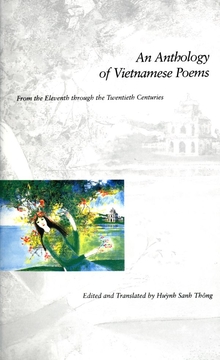The Retreat of the Elephants
WARNING
You are viewing an older version of the Yalebooks website. Please visit out new website with more updated information and a better user experience: https://www.yalebooks.com
An Environmental History of China
Mark Elvin
This landmark account of China’s environmental history, written by an internationally pre-eminent China specialist, "should stand for decades to come as a unique statement on motives, processes, perceptions and consequences of environmental change in China.” (Jennifer L. Mnookin, American Scientist)
This is the first environmental history of China during the three thousand years for which there are written records. It is also a treasure trove of literary, political, aesthetic, scientific, and religious sources, which allow the reader direct access to the views and feelings of the Chinese people toward their environment and their landscape.Elvin chronicles the spread of the Chinese style of farming that eliminated the habitat of the elephants that populated the country alongside much of its original wildlife; the destruction of most of the forests; the impact of war on the environmental transformation of the landscape; and the re-engineering of the countryside through water-control systems, some of gigantic size. He documents the histories of three contrasting localities within China to show how ecological dynamics defined the lives of the inhabitants. And he shows that China in the eighteenth century, on the eve of the modern era, was probably more environmentally degraded than northwestern Europe around this time.
Indispensable for its new perspective on long-term Chinese history and its explanation of the roots of China’s present-day environmental crisis, this book opens a door into the Chinese past.
“Knowing all of Elvin’s previous work, I expected bold, sweeping treatments of many different topics, insights based on unmatched knowledge of primary materials, revealing analyses of environmental change on scales ranging from local to national, and conclusions offering economic and philosophical insights into history. I was not disappointed. Because the book has all of these components, it should stand for decades to come as a unique statement on motives, processes, perceptions and consequences of environmental change in China.”—Jennifer L. Mnookin, American Scientist
“Mark Elvin is a rare historian. . . . The book . . . should stand for decades to come as a unique statement on motives, processes, perceptions and consequences of environmental change in China.”—Vaclav Smil, American Scientist
"A masterful tour de force. As such, there is something of interest for everybody. . . . This book has a lasting quality and is a wonderful addition for those interested in the Chinese historical perception of the environment. It is a must for those interested in environmental history and the development of human-nature interactions in China. Moreover, be prepared to wander off into interesting digressions in the process."—Richard Louis Edmonds, China Quarterly
“Monumental. . . . [This book] conveys a wealth of delicious detail and vivid reportage from 3,000 years of history. . . . If there are times when [the book] threatens to become an anthology, the author’s eye for the telling detail and his enormous literary knowledge come to the rescue with a wealth of delights.”—Jonathan Fenby, Financial Times
"With this remarkable and important new book, The Retreat of the Elephants: An Environmental History of China, Mark Elvin almost single-handedly creates a new field: Chinese environmental history. . . . Elvin draws on what is apparently a lifetime of research and thinking to stretch beyond historical description in order to raise questions about cultural perception, state formation, and economic and demographic imperatives. The book offers much new information, to be sure, but, just as important, it provides new insights and ideas. . . . The book imaginatively uses a wide range of sources. . . . Its use of literary sources and first-hand accounts lends immediacy and humanity to the narrative of environmental changes. . . . The book is indeed a 'treasure trove,' as its dust-jacket says. The diversity of sources it introduces, the provocative insights it provides, and the questions it raises should provide the basis for scholarship in the next generation."—Lillian M. Li, Harvard Journal of Asiatic Studies
“The narrative, written with clarity and verve by one of the leading historians of China, provides an excellent historical context to the contemporary environmental problems of the country. . . . Elvin’s research is impressive. . . . The Retreat of the Elephants is a well-written study that merits the attention of both the social scientists and humanists interest in China.”—Pradyumna P. Karan, History: Reviews of New Books
"The Retreat of the Elephants provides us with many themes worthy of study, and in this respect, it opens the door wide for research into the environmental history of China."—Makoto Ueda, International Journal of Asian Studies
“By far the best history of the interaction between the traditional Chinese and their surroundings. It is a mighty work, stupendously learned, often entertaining. . . . Although Chinese culture is different from ours, Elvin believes that those differences—which he so brilliantly lays out for us—do not, in themselves, explain what happened to China’s environment.”—Jonathan Mirsky, Literary Review
“Taken as a whole, the book is a fascinating, scholarly miscellany of stories.”—Crispin Tickell, Nature Magazine
“Astonishing. . . . Ranging from countless specific examples to thought-provoking ruminations, Elvin meticulously details the ecological consequences of economic growth on Chinese civilization. . . . The chapter on war alone is worth the price of the book, but Elvin really excels at supporting his arguments with marvelous examples, often quoting ancient poetry and song to construct the story of China’s environmental history. . . . This is a fascinating journey through the hearts and minds of a mighty culture that both parallels and diverges from the West’s in important, and perhaps edifying, ways.”—David Lukas, Orion
“The broad and deep documentary basis for this sort of history in China has attracted a handful of scholars, none more ambitious, or skilled, than Mark Elvin. . . . Elvin offers masterful and engaging narratives of deforestation, species loss, agricultural expansion, and the establishment of irrigation. . . . The book is full of interesting details. . . . [It] will stand for a long time as the standard work on the topic. It will prove essential for those who want to understand the long sweep of Chinese history, and it will enhance the perspective of those who think they already understand that saga. The Retreat of the Elephants is a scholarly tour de force.”—J. R. McNeill, Science
“Elvin combines an illuminating account of the 4,000 year-long collision of humans and nature with delightful tidbits about everything under the Chinese sun. . . . As a window into the history of the Middle Kingdom, and an extended account of human interactions with the environment, this is a magisterial work.”—Nicholas D. Kristof, Scientific American
“Mark Elvin has succeeded triumphantly in writing what is likely to remain the definitive work in English for many years to come.”—Michael Rank, The China Review
“The magical nature of nature is brought out in the many poems quoted and discussed.”—Simon Barnes, Times (London)
“This absorbing but difficult book offers a history of the relationship between the Chinese and their environment over the past 3,000 years.”—Times Higher Education Supplement
“Elvin [is] one of the foremost historians of China. . . . Masterly and engaging. . . . Essential for those who want to understand the long sweep of Chinese history, and it will enhance the perspective of those who think they already understand it. A scholarly tour de force.”—J. R. McNeill, Wilson Quarterly
“A classic. . . a work of quite staggering scholarship of a kind that very few historians have achieved in the post-second world war period.”—Richard Grove, Centre for World Environmental History, University of Sussex
Publication Date: September 21, 2006








